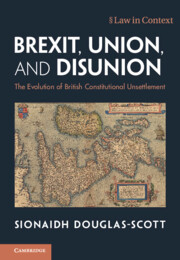Book contents
- Brexit, Union, and Disunion
- Law in Context
- Brexit, Union, and Disunion
- Copyright page
- Contents
- Figures
- Introduction
- Part I Five Case Studies of Acts of Union and Disunion
- Part II Five Themes
- 6 Sovereignty
- 7 Unions and Disunions
- 8 Federalism, Devolution, and Differentiation
- 9 Democracy and Referendums
- 10 Human Rights
- Conclusion
- Index
9 - Democracy and Referendums
from Part II - Five Themes
Published online by Cambridge University Press: 26 October 2023
- Brexit, Union, and Disunion
- Law in Context
- Brexit, Union, and Disunion
- Copyright page
- Contents
- Figures
- Introduction
- Part I Five Case Studies of Acts of Union and Disunion
- Part II Five Themes
- 6 Sovereignty
- 7 Unions and Disunions
- 8 Federalism, Devolution, and Differentiation
- 9 Democracy and Referendums
- 10 Human Rights
- Conclusion
- Index
Summary
The legacy of nineteenth-century constitutionalism hampers the effective realization of democracy in the UK. Bagehot’s eulogizing of the fusion of the executive and legislature now appears to grant far too much power to the government, given the context of parliamentary sovereignty and a ‘first past the post’ electoral system. But democracy is a far richer notion than one which requires merely that power should be exercised by a majority of elected representatives. Democracy also requires that individuals and minorities have certain fundamental protections from majoritarian interests. Democracy in Britain has also been weakened by vagueness as to the role of direct democracy (and how it relates to popular sovereignty) and referendums in the UK. The UK Cabinet Manual (which, absent a codified Constitution, is the closest Britain comes to codifying its constitutional principles) does not specify the role of referendums in British governance, nor suggest that a referendum vote might override other constitutional principles. However, the Brexit referendum, although advisory in status, was nonetheless perceived as binding and implemented. If referendums are to become a more frequent feature of British constitutional practice, there is an urgent need for clear principles regarding their use to be articulated.
Keywords
- Type
- Chapter
- Information
- Brexit, Union, and DisunionThe Evolution of British Constitutional Unsettlement, pp. 426 - 466Publisher: Cambridge University PressPrint publication year: 2023



